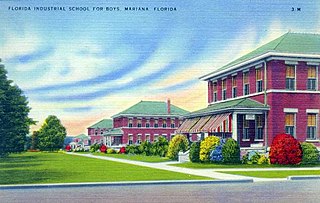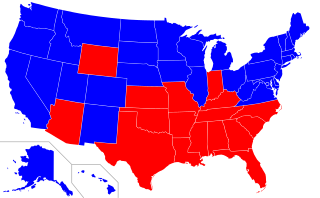
Spanking is a form of corporal punishment involving the act of striking, with either the palm of the hand or an implement, the buttocks of a person to cause physical pain. The term spanking broadly encompasses the use of either the hand or implement, though the use of certain implements can also be characterized as other, more specific types of corporal punishment such as belting, caning, paddling and slippering.

Dunn is the most populous city of Harnett County, North Carolina, United States. The population was 9,263 at the 2010 census. It is, along with Harnett County, part of the Anderson Creek, NC Micropolitan Statistical Area, which is also included in the Raleigh-Durham-Cary, NC Combined Statistical Area.
The World Wide Association of Specialty Programs and Schools was an organization based in Utah, in the United States. WWASPS was founded by Robert Lichfield and was incorporated in 1998. WWASPS stated that it was an umbrella organization of independent institutions for education and treatment of troubled teenagers. Many outside observers believe, however, that the WWASPS-affiliated institutions were actually owned through limited partnerships, many of which have used the same street address by WWASPS or its principal officials or their close relatives. WWASPS is connected to several affiliated for-profit companies. These include Teen Help LLC, the marketing arm of WWASPS and the entity that processes admissions paperwork; Teen Escort Service, a teen escort company that transports teenagers to WWASPS facilities; R&B Billing, which does tuition billing and payment processing; and Premier Educational Systems, LLC, which conducts orientation and training workshops for parents whose children are in WWASPS facilities. WWASPS claims to have "helped" over 10,000 students with issues related to personal behavior. Some participants and parents give positive reports of their experiences, but others say that WWASPS programs were abusive. WWASPS has faced widespread allegations of physical and psychological abuse of the teenagers sent into its programs, resulting in a lawsuit filed against the organization in 2006. WWASPS officials report that the organization is no longer in business, and the facilities originally under it no longer associate with the name, but because of ongoing litigation, it has not been dissolved.

Tranquility Bay was a residential treatment facility affiliated with World Wide Association of Specialty Programs and Schools (WWASPS), located in Calabash Bay, Saint Elizabeth Parish, Jamaica. The facility operated from 1997 to 2009 and received notoriety for its harsh and often abusive treatment of its students, eventually shutting down in 2009 after allegations of child abuse came to light through lawsuits and highly publicized student testimonies. The adolescents reported violence to their parents, only to be ignored.

School discipline relates to actions taken by teachers or school organizations toward students when their behavior disrupts the ongoing educational activity or breaks a rule created by the school. Discipline can guide the children's behavior or set limits to help them learn to take better care of themselves, other people and the world around them.

In criminal justice systems, a youth detention center, known as a juvenile detention center (JDC), juvenile detention, juvenile jail, juvenile hall, or more colloquially as juvie/juvy or the Juvey Joint, also sometimes referred to as observation home or remand home is a prison for people under the age of majority, to which they have been sentenced and committed for a period of time, or detained on a short-term basis while awaiting trial or placement in a long-term care program. Juveniles go through a separate court system, the juvenile court, which sentences or commits juveniles to a certain program or facility.

Westminster Christian Academy is an independent coeducational private Christian school in Town and Country, Missouri, serving students in grades 7–12. As of 2023, the school has an enrollment of 946 students. It was founded in 1976 and moved to its present campus in 2011.
Academy at Dundee Ranch was a behavior modification facility for United States teenagers, founded in 1991 and located at La Ceiba Cascajal, 10 kilometres (6.2 mi) west of Orotina, province of Alajuela, Costa Rica. It was promoted as a residential school offering a program of behavior modification, motivational "emotional growth seminars", a progressive academic curriculum, and a structured daily schedule for teenagers struggling in their homes, schools, or communities.
The Thayer Learning Center or TLC was a military based, Christian boarding school boot camp for troubled teens in Kidder, Missouri from 2002 to 2009. The program enrolled over 100 students and costs run up to $4,000 a month. The program stated that it "... changes, reunites, and restores hope to families across the nation." There has been some controversy in past years. The center is one of many facilities for troubled teens listed on the watch list on the International Survivors Action Committee (ISAC).
Victory Forge Military Academy, located in Port St. Lucie, Florida, is a year-round boarding school that utilizes military-style components for behavior modification. It enrolls "rebellious and troubled" adolescent males under the age of 18. The academy states that it is accredited by the National Association of Christian Education (NACE). The academy is highly controversial and has been subject to numerous allegations of physical and emotional abuse for its use of shackles and beatings.

School corporal punishment is the deliberate infliction of physical pain as a response to undesired behavior by students. The term corporal punishment derives from the Latin word for the "body", corpus. In schools it may involve striking the student on the buttocks or on the palms of their hands with an implement such as a rattan cane, wooden paddle, slipper, leather strap, belt, or wooden yardstick. Less commonly, it could also include spanking or smacking the student with an open hand, especially at the kindergarten, primary school, or other more junior levels.

The United States incarcerates more of its youth than any other country in the world, through the juvenile courts and the adult criminal justice system, which reflects the larger trends in incarceration practices in the United States. In 2010, approximately 70,800 juveniles were incarcerated in youth detention facilities alone. As of 2006, approximately 500,000 youth were brought to detention centers in a given year. This data does not reflect juveniles tried as adults. As of 2013, around 40% were incarcerated in privatized, for-profit facilities.

The Florida School for Boys, also known as the Arthur G. Dozier School for Boys (AGDS), was a reform school operated by the state of Florida in the panhandle town of Marianna from January 1, 1900, to June 30, 2011. A second campus was opened in the town of Okeechobee in 1955. For a time, it was the largest juvenile reform institution in the United States.
Sorenson's Ranch School is a ranch school for struggling youth. Sorenson's Ranch School is located in Koosharem, Utah. Sorenson's Ranch School is a licensed residential treatment center in the State of Utah. Sorenson's Ranch School is accredited through the Northwest Accreditation Commission
In the United States, the school-to-prison pipeline (SPP), also known as the school-to-prison link, school–prison nexus, or schoolhouse-to-jailhouse track, is the disproportionate tendency of minors and young adults from disadvantaged backgrounds to become incarcerated because of increasingly harsh school and municipal policies. Additionally, this is due to educational inequality in the United States. Many experts have credited factors such as school disturbance laws, zero-tolerance policies and practices, and an increase in police in schools in creating the "pipeline". This has become a hot topic of debate in discussions surrounding educational disciplinary policies as media coverage of youth violence and mass incarceration has grown during the early 21st century.

The Glen Mills Schools was a youth detention center for juvenile delinquents located near Glen Mills in Thornbury Township, Delaware County, Pennsylvania, United States, for boys between 12 and 21 years of age. The school was founded in 1826 and was the oldest surviving school of its type in the United States until all residents were ordered removed on March 25, 2019, by the Pennsylvania Department of Human Services. The school's licenses were subsequently revoked for not complying with the state's Human Services Code and regulations.
Shepherd's Hill Academy (SHA) is an accredited and licensed Christian therapeutic boarding school located in Martin, Georgia, United States, that provides year-round residential care and a private school for grades 7 through 12.

Corporal punishment of minors in the United States, meaning the infliction of physical pain or discomfort by parents or other adult guardians, including in some cases school officials, for purposes of punishing unacceptable attitude, is subject to varying legal limits, depending on the state. Minor children in the United States commonly experience some form of corporal punishment, such as spanking or paddling. Despite opposition from medical and social-services professionals, as of 2024, the spanking of children is legal in all 50 states and, as of 2014, most people still believe it is acceptable provided it does not involve implements. Corporal punishment is in the United States usually considered distinct from illegal child abuse, although the distinction can often be vague.

The youth control complex is a theory developed by Chicano scholar Victor M. Rios to describe what he refers to as the overwhelming system of criminalization that is shaped by the systematic punishment that is applied by institutions of social control against boys of color in the United States. Rios articulates that there are many components of this complex which are enacted upon youth throughout their daily lives. For example, "while being called a 'thug' by a random adult may seem trivial to some people, when a young person is called a 'thug' by a random adult, told by a teacher that they will never amount to anything, and frisked by a police officer, all in the same day, this combination becomes greater than the sum of its parts." Scholars trace the origins of the youth control complex back to the mid-1970s. In addition, the criminalization and surveillance of Black and Latino bodies increased in the post-9/11 era.
The troubled teen industry is a broad range of youth residential programs aimed at struggling teenagers. The term encompasses various facilities and programs, including youth residential treatment centers, wilderness programs, boot camps, and therapeutic boarding schools.












